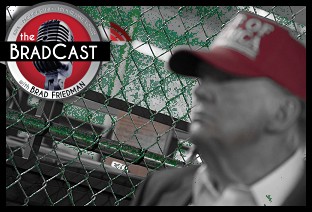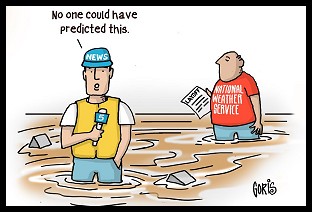READER COMMENTS ON
"Restraining Order Filed in New Mexico to Halt Purchase of Sequoia Voting Machines"
(14 Responses so far...)
COMMENT #1 [Permalink]
...
Dredd
said on 12/21/2005 @ 3:28 pm PT...
John, a TRO (temporary restraining order) is a mini-injunction, which requires a reasonable showing ... which means they think they have a good case.
I think it can only help to improve the bad situation in our nation at this time. The bad situation about election quality.
No paper trail, no openness of electronic voting machines, and a lot of that, means we need these kinds of actions.
Glad to see it.
COMMENT #2 [Permalink]
...
Doug Eldritch
said on 12/21/2005 @ 4:22 pm PT...
Have they tested for a fact yet the Sequoia AVC to see if it suffers the same .abo hacking exploit as Diebold?
Several experts including Washburn were saying it does or may.....its about time to test all the Sequoia products and find out, it wouldn't surprise me if Sequoia & Diebold share source code.
Doug
COMMENT #3 [Permalink]
...
MMIIXX
said on 12/21/2005 @ 4:33 pm PT...
Does "TRO" invoke "discovery" ?
COMMENT #4 [Permalink]
...
Robert Lockwood Mills
said on 12/21/2005 @ 4:46 pm PT...
COMMENT #5 [Permalink]
...
Sandy D.
said on 12/21/2005 @ 9:59 pm PT...
MMIXX: No, a TRO does not normally trigger a discovery process. When you go into court with a TRO you are asking the court to make an immediate decision based on the evidence in your Complaint, legal memos, affidavits and exhibits which you have just filed. So you have to have enough evidence at that point in time to let the judge rule in your favor (you must prove that you are likely to win the case on the merits [claim of fraud or violation of state law, or whatever] and that there will be irreparable harm if the TRO is not granted [disenfranchising voters seems to meet that test - an affidavit from an expert showing that the machines are not counting votes or flipping votes should do that]).
However, that being said, if a TRO is granted after the evidentiary hearing, the court will set a time for further proceedings in anticipation of a trial. At that point you can start making discovery requests for documents and witness depositions.
This is just generally how the procedure works. I am an Oregon attorney, not a New Mexico attorney. Each state has little variations on procedure, but are usually quite similar.
This is a very encouraging turn of events.
COMMENT #6 [Permalink]
...
Ursula S
said on 12/22/2005 @ 3:48 am PT...
And the ridiculous state of Nevada has these machines all over the state with printers on them except in the City of Las Vegas where they don't have printers and you can't do a recount on them. Wonderful.
The Governor and AG of the State served as the NV Bush Campaign's co-chairs in the last election just after they forced all counties to buy those new Sequoias with printers after SOS Dean Heller said they were the greatest! After the Presidential election, he was pictured on the Sequoia website spouted the merits of the machines. Stupid repukes. Bush barely beat Kerry in Nevada.
COMMENT #7 [Permalink]
...
Robert Lockwood Mills
said on 12/22/2005 @ 7:15 am PT...
Nevada Secretary of State Dean Heller was one of the panelists at the Nov. 7, 2004 Common Cause hearing in D.C. He was proud as a peacock about the forward-looking steps Nevada had taken (in contrast to those other naughty states that hadn't). to guarantee transparency.
A very personable guy, Heller. Likable. He made me feel Nevada was light years ahead of the curve, and that if Ohio and Florida had followed his state's example Kerry would have won (actually, Gore would have been running for re-election).
It now appears Heller was acting as a shill for the G.O.P. They do have them all over, don't they?
COMMENT #8 [Permalink]
...
Frankly
said on 12/22/2005 @ 7:26 am PT...
From Kim Zetter..
"Hursti conducted the same test for the California secretary of state's office Tuesday. The office did not return several calls for comment." Did this take place?
I heard John Kerry on the Ed Schultz Show, actually talking about the vulnerability of the Diebold machines, in regard to the Leon County hack. Maybe Mark Crispin Miller got through to him.
Finally, isn't it a law that the memory cards from the presidential election have to be held for 22 months? Someone with a law degree should be getting real busy right about now. It's important to note that the "hackability" of these machine's was "built in." In other words, designed to be hacked. Frankly
COMMENT #9 [Permalink]
...
John Gideon
said on 12/22/2005 @ 10:52 am PT...
Ursula S. #7 - Actually Clark County NV (Las Vegas) does have the printers on their machines. Last July Ex-VP of Sequoia, Alfie Charles, told the Washington state Voting System Certification Panel, during testimony pursuant to state certification of their AVC Edge II w/vvpat printer, that proof of their success was an audit carried out in every county in Nevada in Nov. 2004.
My associate and I were ready for this statement. She had already spoken with elections officials across the state and with a member of the Secretary of State's office. She learned that only Clark County did the state mandated hand recount. No other county did the audit, ignoring state law. In fact, most of those counties actually asked Sequoia personnel to conduct the vote counting for them because the machines were too new and they did not understand them completely. You can read about the Nevada audit on VotersUnite.Org
We hit Charles with this information and he shut-up and made no attempt to defend his lie.
It's funny how powerful the truth is sometime.
COMMENT #10 [Permalink]
...
JIMCIRILE
said on 12/22/2005 @ 10:53 am PT...
COMMENT #11 [Permalink]
...
MMIIXX
said on 12/22/2005 @ 12:50 pm PT...
Thankz SANDY D.
First Diebold ,now Sequoia ...what a month ,evidentiary hearing should be interesting .
COMMENT #12 [Permalink]
...
Doug Eldritch
said on 12/22/2005 @ 2:08 pm PT...
John:
I suspect that has more to do with Paul Lehto's lawsuit than anything else. Washington was originally going to have the machines, especially in Snomohish County, but after it was all filed in court the decision was made that the machines are not verifiable and no one can see how they count votes.
So pursuant to that, the entire state has pretty much dropped them for mail-in ballots.
Full discovery process of Lehto's lawsuit for resolution
Further since it was remanded, they have gotten access to the machines. What I hope is that this takes full discovery process, EVERY memory card is checked just like with Diebold, and EVERY audit log is checked to see where votes were purged or deleted.
It is VITAL that in Washington, and wherever they are, that this fraud and miscount is examined to permanently bar unverified machines.
This is like throwing trojan horses into the ring of a war here. You don't give your car keys out to every crook on Main Street, and that means you don't give out Sequoia machines to anyone.
Doug E.
COMMENT #13 [Permalink]
...
John Gideon
said on 12/22/2005 @ 8:16 pm PT...
Doug E. #12 - Not quite right. SnoCo still has Sequoia Edge DREs and will continue to use them, for now, because the county council does not want to go Vote-By-Mail. That will probably change after the first of the year when the Dems have the majority on the council.
There are many counties in WA that will use Sequoia Edge II DREs for disabled access voting. That is if the state certifies it for that use and I am prepared to go back and battle that with them again. I won last time and can win again.
The problem with SnoCo's machines, besides the obvious fact that they are DREs, is that they are the older version of the Edge and they cannot be upgraded with the vvpat printer at this time. That's a problem for the county.
COMMENT #14 [Permalink]
...
Doug Eldritch
said on 12/23/2005 @ 5:04 pm PT...
John: Actually the County City Council, Snohomish County in Seattle officially changed to absentee-ballots the other day. (Though they voted to not go with vote by mail for now)
This was just very recently that the Council changed, after the new elections:
3-2 Majority for City Council after Somers is elected
Most of the area is already voting by absentee ballots in Snohomish County now, and they are presently crafting to make the changes permanent by January.
Doug E.


 Trump IRS Agrees to Allow Churches to Endorse Political Candidates. Are All Nonprofits Next?: 'BradCast' 7/15/25
Trump IRS Agrees to Allow Churches to Endorse Political Candidates. Are All Nonprofits Next?: 'BradCast' 7/15/25 'Green News Report' 7/15/25
'Green News Report' 7/15/25
 Repub Support for Immigrants Skyrockets Amid Trump's Crackdown: 'BradCast' 7/14/25
Repub Support for Immigrants Skyrockets Amid Trump's Crackdown: 'BradCast' 7/14/25  Sunday 'Totally Predictable' Toons
Sunday 'Totally Predictable' Toons Democracy STILL Our Best Way Out of This Mess -- And Repubs Know It: 'BradCast' 7/10/25
Democracy STILL Our Best Way Out of This Mess -- And Repubs Know It: 'BradCast' 7/10/25 'Green News Report' 7/10/25
'Green News Report' 7/10/25 'Mass Shooter Subsidy'?: More Dumb, Deadly Stuff in Trump's New Law: 'BradCast' 7/9/25
'Mass Shooter Subsidy'?: More Dumb, Deadly Stuff in Trump's New Law: 'BradCast' 7/9/25  Trump's New Law Supersizes ICE, Mass Detention, Militarization: 'BradCast' 7/8/25
Trump's New Law Supersizes ICE, Mass Detention, Militarization: 'BradCast' 7/8/25  'Green News Report' 7/8/25
'Green News Report' 7/8/25 Texas Flooding Tragedy Was Both Predictable and Predicted: 'BradCast' 7/7/25
Texas Flooding Tragedy Was Both Predictable and Predicted: 'BradCast' 7/7/25 Sunday 'Big Billionaire Bonanza' Toons
Sunday 'Big Billionaire Bonanza' Toons Sunday 'Total Obliteration' Toons
Sunday 'Total Obliteration' Toons 'Green News Report' 6/26/25
'Green News Report' 6/26/25 Thank You For Your Attention to This Matter:
Thank You For Your Attention to This Matter: Mamdani Primary 'Win' Augurs New Era of Rising Progressives: 'BradCast' 6/25/25
Mamdani Primary 'Win' Augurs New Era of Rising Progressives: 'BradCast' 6/25/25 U.S. Authoritarianism Under-way (But We're Still Here to Fight It): 'BradCast' 6/24/25
U.S. Authoritarianism Under-way (But We're Still Here to Fight It): 'BradCast' 6/24/25 'Anti-War' Trump Attacks Iran on False Claims About WMD: 'BradCast' 6/23/25
'Anti-War' Trump Attacks Iran on False Claims About WMD: 'BradCast' 6/23/25 Senate Health Care Cuts 'More Extreme' Than House Version: 'BradCast' 6/19/25
Senate Health Care Cuts 'More Extreme' Than House Version: 'BradCast' 6/19/25 What 'Anti-War President'? MAGA Civil War Over Trump, Iran: 'BradCast' 6/18/25
What 'Anti-War President'? MAGA Civil War Over Trump, Iran: 'BradCast' 6/18/25 Trump's 'Remigration' is Code for 'Ethnic Cleansing': 'BradCast' 6/17/25
Trump's 'Remigration' is Code for 'Ethnic Cleansing': 'BradCast' 6/17/25 Last Weekend Today: 'BradCast' 6/16/25
Last Weekend Today: 'BradCast' 6/16/25
 VA GOP VOTER REG FRAUDSTER OFF HOOK
VA GOP VOTER REG FRAUDSTER OFF HOOK Criminal GOP Voter Registration Fraud Probe Expanding in VA
Criminal GOP Voter Registration Fraud Probe Expanding in VA DOJ PROBE SOUGHT AFTER VA ARREST
DOJ PROBE SOUGHT AFTER VA ARREST Arrest in VA: GOP Voter Reg Scandal Widens
Arrest in VA: GOP Voter Reg Scandal Widens ALL TOGETHER: ROVE, SPROUL, KOCHS, RNC
ALL TOGETHER: ROVE, SPROUL, KOCHS, RNC LATimes: RNC's 'Fired' Sproul Working for Repubs in 'as Many as 30 States'
LATimes: RNC's 'Fired' Sproul Working for Repubs in 'as Many as 30 States' 'Fired' Sproul Group 'Cloned', Still Working for Republicans in At Least 10 States
'Fired' Sproul Group 'Cloned', Still Working for Republicans in At Least 10 States FINALLY: FOX ON GOP REG FRAUD SCANDAL
FINALLY: FOX ON GOP REG FRAUD SCANDAL COLORADO FOLLOWS FLORIDA WITH GOP CRIMINAL INVESTIGATION
COLORADO FOLLOWS FLORIDA WITH GOP CRIMINAL INVESTIGATION CRIMINAL PROBE LAUNCHED INTO GOP VOTER REGISTRATION FRAUD SCANDAL IN FL
CRIMINAL PROBE LAUNCHED INTO GOP VOTER REGISTRATION FRAUD SCANDAL IN FL Brad Breaks PA Photo ID & GOP Registration Fraud Scandal News on Hartmann TV
Brad Breaks PA Photo ID & GOP Registration Fraud Scandal News on Hartmann TV  CAUGHT ON TAPE: COORDINATED NATIONWIDE GOP VOTER REG SCAM
CAUGHT ON TAPE: COORDINATED NATIONWIDE GOP VOTER REG SCAM CRIMINAL ELECTION FRAUD COMPLAINT FILED AGAINST GOP 'FRAUD' FIRM
CRIMINAL ELECTION FRAUD COMPLAINT FILED AGAINST GOP 'FRAUD' FIRM RICK SCOTT GETS ROLLED IN GOP REGISTRATION FRAUD SCANDAL
RICK SCOTT GETS ROLLED IN GOP REGISTRATION FRAUD SCANDAL VIDEO: Brad Breaks GOP Reg Fraud Scandal on Hartmann TV
VIDEO: Brad Breaks GOP Reg Fraud Scandal on Hartmann TV RNC FIRES NATIONAL VOTER REGISTRATION FIRM FOR FRAUD
RNC FIRES NATIONAL VOTER REGISTRATION FIRM FOR FRAUD EXCLUSIVE: Intvw w/ FL Official Who First Discovered GOP Reg Fraud
EXCLUSIVE: Intvw w/ FL Official Who First Discovered GOP Reg Fraud GOP REGISTRATION FRAUD FOUND IN FL
GOP REGISTRATION FRAUD FOUND IN FL

































